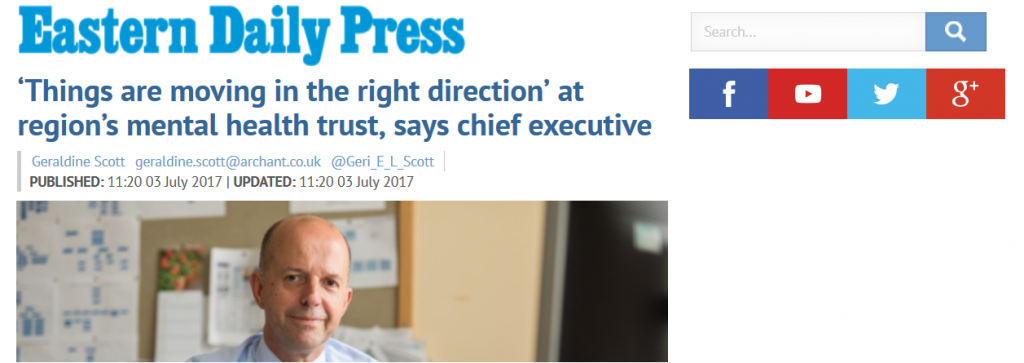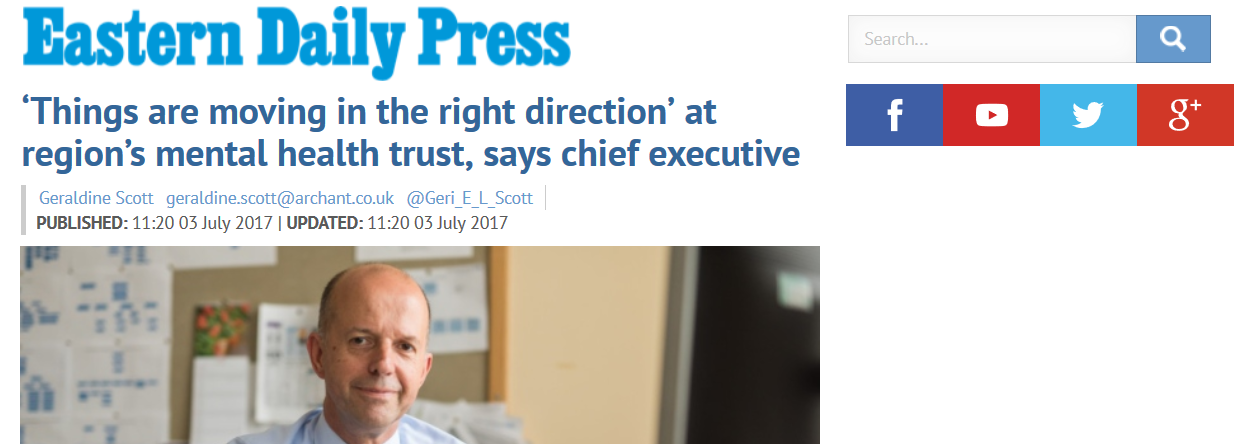Geraldine Scott of the EDP ‘interviews’ Michael ‘Payrise’ Scott, the £175,000 per year Chief Executive of Norfolk and Suffolk NHS Foundation Trust (NSFT):
The region’s mental health trust has reported it has seen financial growth at the same time as slashing its deficit for the first time in five years.
That sounds great.
Sadly, ‘slashing its deficit’ means diverting taxpayer’s money meant for front line services to paying off NSFT’s debts.
It means over the next two years there is a planned £15m investment into mental health services in the region, including a £4m new inpatient unit in west Norfolk and a £3m redesign at the Norvic Clinic in Thorpe St Andrew.
Now the spin starts. The new £4m inpatient unit in West Norfolk will have 16 beds and replaces the 20+ beds which NSFT will be closing at the Fermoy Unit in King’s Lynn, which the Board of NSFT tried to close without a replacement until we campaigned against it. So, rather than an ‘investment’, it is actually a disinvestment and refurbishment. The new unit is to be built in the empty old age psychiatric wards that NSFT closed during the radical redesign but claimed were only ‘not being used currently’ to avoid a consultation process. Older people are being transported, and sometimes die, hundreds of miles away from their loved ones as a result.
The ‘redesign’ at the Norvic Clinic is not an investment at all but refurbishment, part and parcel of the ordinary estate management and maintenance that any health organisation should undertake. It is puzzling that NSFT is spending a disproportionate amount of its ‘investment’ on loss-making forensic services. Curiously, the current Medical Director and his predecessor are both forensic psychiatrists.
Neither of these developments will see any new capacity for mental health services.
In fact, the Sustainability and Transformation Plan (STP) indicates that NSFT will have twenty per cent fewer referrals and have ten per cent fewer patients on its caseload. That sounds suspiciously like the disingenuous ‘improvements’ of the disastrous ‘radical redesign’: cuts upon cuts upon cuts.
NSFT Chief Executive, Michael ‘Payrise’ Scott, is ‘leading’ the mental health ‘workstream’ of the STP.
And Norfolk and Suffolk NHS Foundation Trust (NSFT) chief executive, Michael Scott, said although all health care organisations were facing tough times, the picture at NSFT was perhaps looking brighter.
We will investigate this bogus claim shortly.
He said: “It’s a result of increased investment following increased confidence in NSFT alongside hard-working staff ensuring services are run as efficiently as possible, while continuing to improve the quality of those services.
That’s an interesting claim when NSFT appears to be seeing fewer patients recently and has done little about ‘New Ways of Shirking’. The management building at Hellesdon Hospital is more like a tea room than a corporate headquarters.
How are services improving when the number of unexpected deaths increased by 107 per cent, more than doubling, between 2012-13 and 2016-17?
How are services improving when the beds crisis has become much, much worse?
In April and May 2017, NSFT spent half of its annual out of trust beds budget in the first two months of the financial year.
The NSFT Board has closed 139 mental health beds since 2012 and ignored the beds crisis.
In May 2017 alone, there were nineteen unexpected deaths at NSFT.
The average in 2012-13 was seven per month.
“We have seen growth for the first time in five years – which has totalled £15m for 2017/18 – while at the same time we have made the highest capital investment that this trust has been for quite some time, all of which is great news for our service users and staff.”
Capital investment is rising after cuts made to pay off the deficit created by inadequate funding and the tens of millions of pounds wasted on the radical redesign.
We can’t make the arithmetic work for Michael Scott’s £15m claim.
The EDP has a very interesting chart showing operating income:
It shows NSFT’s income will increase from £216.8m in 2013-14 to £220.1m in 2017/18. Over four years, this is an increase of £3.3m.
That’s a year on year increase in income of 0.38 per cent. Yes, not 3.8 per cent. 0.38 per cent.
This year, 2016/17, NSFT’s income will still be more than £1 million lower than three years ago, when our campaign started.
NSFT’s income in 2012/13, as the disastrous radical redesign began, was £219.4m. So NSFT’s income this year will be £3.7 million lower than it was four years ago. Using 2012/13 as the starting point, the year on year increase is 0.06 per cent. Really. So much for parity of esteem.
While mental health services have been cut, Michael ‘Payrise’ Scott helped himself to a 25 per cent pay rise in 2014.
Michael ‘Payrise’ Scott’s salary has risen at sixteen times the rate of NSFT’s income since 2013/14. And that doesn’t even include the money the Chief Executive trousered from his ‘relocation allowance’ of £8,000 for moving his place of work a couple of miles from west Norwich to Hellesdon.
Matters are certainly moving in the right direction for Michael Scott’s salary. His bank manager will be very pleased with his performance.
In the year 2015-16, the latest with accounts available, the cost of the salaries of NSFT’s directors increased to more than £1 million (£1,045,000 to be exact). This was a 10.1 per cent increase in just twelve months (from £949,000 the year before). That’s more than twenty six times the annual 0.38 per cent increase in NSFT’s income.
The trust has been plagued by controversy in recent years, and Mr Scott admitted when he took up his position three years ago there was a lot of work to do. He said the organisation knew mental health services “needed more money to at least bring us somewhere near the same level of physical healthcare funding”.
Is Michael Scott talking about his salary again?
If Scott isn’t talking about insatiable greed, this is interesting and unusual. Michael Scott admits mental health services need more money and seems to imply they have received it. Well, NSFT has received its 0.38 per cent increase in annual income.
Let’s see what is planned to happen in physical health at the largest physical health trust in Norfolk and Suffolk, the Norfolk and Norwich University Hospitals NHS Foundation Trust (NNUH) according to its most recently-published five year plan:
NNUH’s income will increase from £479.3 million in 2013-14 to £554.6m in 2017/18. Over four years, this is an increase of £75.3m.
That’s a year on year increase of 3.7 per cent. Yes, not 0.37 per cent. 3.7 per cent.
So, the largest physical health trust, NNUH, is seeing its income rise nearly ten times faster than the largest mental health trust, NSFT. Each year, the NNUH receives an additional £3.70 for every £100 spent in the previous year. NSFT receives 38 pence.
NSFT’s increase isn’t enough to even come close to keeping pace with the public sector pay cap of one per cent, never mind inflation.
What a good job Michael Scott and the NSFT Board has done negotiating with commissioners. They should be proud.
He added: “We’re not there yet, but it feels that locally we’re now pushing on a more open door, and we are all pushing together, as the national agenda has finally shifted.
“No-one thinks we can rest on our laurels in ensuring mental health is alongside others at the front of the queue for NHS investment, and there is a lot we still need to do here to continue to improve our services and ways of working, but things are moving in the right direction.”
The figures above demonstrate that Michael Scott is living on Fantasy Island.
NSFT’s Chief Executive is feeling better, he’s getting paid more than the Prime Minister, Theresa May. But what about those or rely upon, or work in, mental health services?
Michael Scott goes on to claim:
Since April 1, 2015, the trust has recruited 1,159 people, of which 824 are clinical frontline staff.
Just as Michael ‘Payrise’ Scott ignores the inconvenient facts when we question the increasing number of deaths and the beds and service closures at NSFT, Michael Scott misleadingly ignores the large numbers of staff who are leaving NSFT. It is obviously the net recruitment figure that matters.
It is more of the misleading, expensive spin-doctoring we’ve come to expect from NSFT. NSFT massively increased its Comms budget as assertive outreach and homeless teams were closed.
In 2012-13, NSFT employed 1,250 nursing staff. By 2015-16, this had fallen by nearly ten per cent, to 1,132.
Mr Scott said although the trust was pleased with improvements to quality, finances and staff moral, it recognised there were still steps to take.
“One of the issues we will continue to focus on is the amount we spend on out of area and out of trust placement.
Michael ‘Payrise’ Scott’s focus is entirely financial, whether on his remuneration or the finances of the trust.
Since Michael ‘Payrise’ Scott became Chief Executive, unexpected deaths and the use of out of trust beds, frequently in private hospitals, has soared.
You have sat too long for any good you have been doing lately… Depart, we say; and let us have done with you
Of course, NSFT Comms couldn’t find anybody from the NSFT Board to appear on camera to talk to BBC viewers about the shameful way in which Katrina Rolph was failed. They were probably too busy putting their efforts into this puff piece.
We need a full public inquiry into the mental health Mid Staffs rather than expensive and misleading spin from a man who mistakenly believes he is worth more than the Prime Minister.
If you can bear to do so, you can read the spin by clicking on the image below:




IS Michael Scott referring to his ever increasing salary, when he says ‘things are moving in the right direction at NSFT’……..I can only wonder what he bases this comment on?? Certainly, not death rates, not patient satisfaction, not treatment rates, not complaints, not staffing levels, bed numbers, staff surveys, not financial management, Reduction in out of area beds, or parity of esteem…. Or as I I call it, ‘parity of pipe dream’. So I’m confused.???? It would be funny it it wasn’t tragic…..I feel so sorry for all those let down by the trust…..once the trust was considered one of the best in the country, now its dragging itself out of special measures……until the next inspection….
Your article helped me a lot, is there any more related content? Thanks! https://www.binance.com/sl/register?ref=T7KCZASX
buying prescription drugs in mexico: Online Pharmacies in Mexico – mexican online pharmacies prescription drugs
?»?legitimate online pharmacies india http://indiaph24.store/# buy medicines online in india
india pharmacy
pharmacy website india https://indiaph24.store/# indianpharmacy com
top 10 pharmacies in india
online shopping pharmacy india http://indiaph24.store/# cheapest online pharmacy india
buy medicines online in india
mexico pharmacy: Online Pharmacies in Mexico – mexican online pharmacies prescription drugs
reputable indian online pharmacy https://indiaph24.store/# india pharmacy
top 10 online pharmacy in india
mexican pharmaceuticals online: mexico pharmacy – mexican pharmaceuticals online
indian pharmacy paypal https://indiaph24.store/# india pharmacy mail order
world pharmacy india
medicine in mexico pharmacies: mexico pharmacy – mexico pharmacy
mexico drug stores pharmacies: Mexican Pharmacy Online – medicine in mexico pharmacies